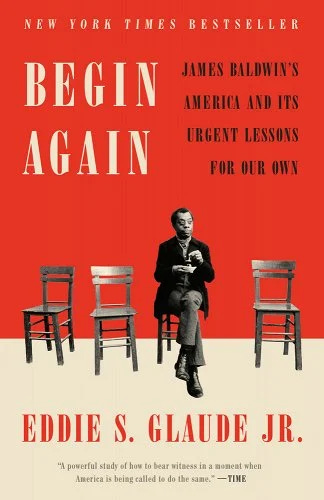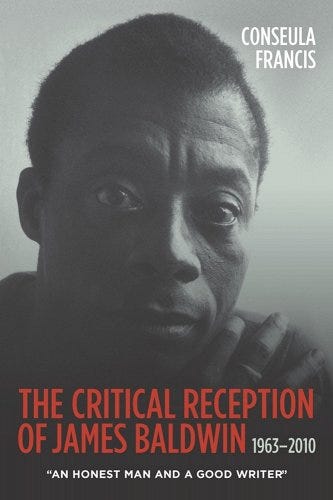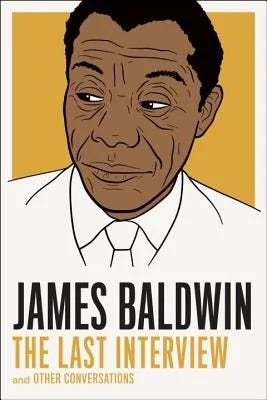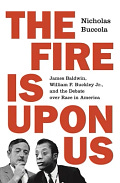"We Have to Teach Young People to Think"
Lessons from a James Baldwin interview with Studs Terkel
I’ve nudged
off of his Wednesday slot because one of those weird confluences have happened where it feels like the universe is trying to tell me something, and if that’s the case, why not share it with the world?Yesterday morning, I was doing two things simultaneously. One was scrolling Twitter (the social media platform Elon Musk wants us to call X). The other was listening to a 1961 Studs Terkel interview with James Baldwin on the occasion of the publication of his essay collection, Nobody Knows My Name: More Notes from a Native Son.
Baldwin was well-known and well-established by this time. He’d returned to America from self-exile in Paris and finished the manuscript for what would become his novel, Another Country. He had left the U.S. in an effort to shake free of a country that seemed to loathe his very existence. Recognizing that you cannot deny who you are, and where you come from, he came home to become more intimately and directly involved with the Civil Rights movement.
While I was listening to Terkel’s interview with Baldwin I opened a link from Twitter leading to a Miami Herald story on the internal comments of Florida state officials which led to the rejection of the AP African American Studies curriculum in the state. The comments seem to reflect a desire of the state officials to further a “both sides” narrative of chattel slavery, that in some ways, slavery just wasn’t as bad as we’ve been led to believe.
One example reported by the Herald says: “For example, a lesson in the Advanced Placement course focused on how Europeans benefited from trading enslaved people and the materials enslaved laborers produced. The state objected to the content, saying the instructional approach “may lead to a viewpoint of an ‘oppressor vs. oppressed’ based solely on race or ethnicity.”
Literally, as I was reading this story, Terkel’s interview with Baldwin came to this passage:
Well, one of the reasons, for example, I think that our youth are so badly educated, and it is inconceivably badly educated, is because education demands a certain daring, a certain independence of mind. We have to teach young people to think. And to teach young people, in order to teach young people to think you have to teach them to think about everything. There mustn't be something they cannot think about. If there's something, if there's one thing they can't think about then very shortly they can't think about anything, you know. Now, there's always something in this country, of course, one cannot think about. What one cannot think about is the Negro, you know. Now, this may seem like a very subtle argument but I don't think so. I think that, really, time will prove the connection between the level, you know, of the lives we lead and this extraordinary endeavor to avoid Black men.
I could not imagine a more on-the-nose insight as to what’s currently happening in Florida (and other places around the country) right now, delivered by a man speaking from more than 60 years ago.
One of my most consistent laments is how our system and structures of education are not organized around teaching young people to think, but every time I sing these blues, I must remind myself that things do not need to be this way, that what we are doing to and for students can change in an instant.
One of the recurrent themes in Baldwin’s work is the necessity of truly knowing oneself as a precondition for freedom. In the same interview he speaks of his own liberation from the shame of his upbringing, his heritage as an inner-city Black man in America, as a welcome and necessary byproduct of his time abroad.
His novel, Giovanni’s Room explores the inner turmoil and tragedy of denying who you love.
Often in his work Baldwin discusses the harm being done to white people due to their refusal to reckon with the reality of what it means for this country to have been built on the subjugation of Black people. Writing in the New York Times in 1965, after recounting the kind of routine sense of alienation he experiences as a Black man in a white world, the wearying nature of these repeated interactions, Baldwin observes:
But what happens to the poor white man's, the poor white woman's, mind? It is this: they have been raised to believe, and by now they helplessly believe, that no matter how terrible some of their lives may be and no matter what disaster overtakes them, there is one consolation like a heavenly revelation--at least they are not black. I suggest that of all the terrible things that could happen to a human being that is one of the worst. I suggest that what has happened to the white Southerner is in some ways much worse than what has happened to the Negroes there.
Sheriff Clark in Selma, Ala., cannot be dismissed as a total monster; I am sure he loves his wife and children and likes to get drunk. One has to assume that he is a man like me. But he does not know what drives him to use the club, to menace with the gun and to use the cattle prod. Something awful must have happened to a human being to be able to put a cattle prod against a woman's breasts. What happens to the woman is ghastly. What happens to the man who does it is in some ways much, much worse. Their moral lives have been destroyed by the plague called color.
Baldwin argues - and certainly history has proved him correct - that to deny the world we know ultimately becomes a burden that is impossible to carry, this moral injury too great to be endured.
In that same interview with Terkel, Baldwin expounds on the role of political leadership in this dynamic:
I think all the Southern politicians have failed their responsibility to the white people of the South. Somebody in the South must know that obviously the situation, the status quo, will not exist another hundred years and their real responsibility is to prepare the people who are now forming those mobs and prepare those people for that day, you know, to minimize the damage to them, even. Now, the majority rule in the South is not a majority rule at all. It's a mob rule. And what these mobs fill is a moral vacuum which is created by the lack of a leader.
I often edge towards despair when I think about the rise of the authoritarian impulse in this country and how it is fueled by a passionate desire to roll back progress, but the clarity of Baldwin’s analysis kindles some measure of hope. So much of what I find myself writing about in this space and elsewhere is my concern over the things we seem to be losing, but the thing that keeps me (personally) sane is doing the work of noticing, of witnessing. Baldwin addresses this towards the end of the interview with Terkel.
But I mean the effort, it seems to me, is to, if you can examine and face your life you can discover the terms in which you are connected to other lives and they can discover, too, the terms in which they are connected to other people. It's happened to every one of us I'm sure, you know, that one has read something which you thought only happened to you. And you discover that it happened a hundred years ago to Dostoyevsky, and this is a very great liberation, you know, for the suffering, struggling person who always thinks that he's alone.
We are not alone, not as long as we can express the experience of being human.
At the very end of the interview, Terkel asks Baldwin who he is now. Baldwin replies, “Who, indeed? Well, I may be able to tell you quite who I am but I think I'm discovering who I'm not. I want to be an honest man, and I want to be a good writer. And I don't know if one ever gets to be what one wants to be, you know. I think you just have to play it by ear. And pray for rain.”
Some reading about James Baldwin
I’ve linked a number of Baldwin’s own books in the post above, but here’s some additional reading on the man and his work that might be of interest.




The Critical Reception of James Baldwin 1963-2010: An Honest Man and a Good Writer by Conseula Francis.
James Baldwin: The Last Interview (And Other Conversations)
The Fire Is Upon Us: James Baldwin, William F. Buckley Jr., and the Debate Over Race in America by Nicolas Buccola
Begin Again: James Baldwin's America and Its Urgent Lessons for Our Own by Eddie Glaude Jr.



John, thanks for this. Always, not just this one.
I’ve tried to start Baldwin a couple times and haven’t been hooked. Can you make a recommendation on what might be a good place to start if I’d like to make a third go of it.
I suspect this maybe a silly question.
-Matt
I would add "We have to teach young people to feel"